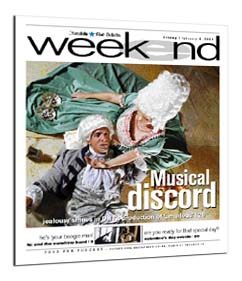
[ WEEKEND ]
COURTESY OF BRAD GODA
Paul Palmore as Antonio Salieri, front, and Todd Evans as Wolfgang Amadeus Mozart in Diamond Head Theatre's production of "Amadeus."
When envy begets
a villain
Life isn't fair. A simple notion, perhaps, but for Antonio Salieri, the court composer for the emperor of Austria in the late 18th century, it pretty much drives him mad in his lust to surpass the genius of Wolfgang Amadeus Mozart.
"Many people say Salieri is absolutely evil," says Paul Palmore, who portrays the musician in Diamond Head Theatre's production of "Amadeus" that opens tonight. "But he isn't. The guy just got a bad bargain coming up against a natural genius in Mozart."
'Amadeus'
Where: Diamond Head Theatre, 520 Makapuu Ave.When: 8 p.m. today, tomorrow and Thursday, and 4 p.m. Sunday (schedule repeats through Feb. 22)
Tickets: $12, $22, $32 and $42
Call: 733-0274
"Amadeus" explores the rivalry between Mozart and Salieri, who is consumed with envy of Mozart's prodigious musical talents.
"He finds himself incredibly mediocre by comparison," Palmore says. "It's a story of conflict between virtuous mediocrity and feckless genius."
Critics have praised the play's craftsmanship and its penetrating psychological study of the effects of success and failure and the search for spirituality.
Palmore, 51, says he "loves" the process of re-creating the Salieri character and his gambit of emotions, and his onstage aging from young to old man.
"In the play's beginning, Salieri prays and asks God for fame as a music composer, and God gives him everything he asks for. But he still complains because he finds someone, Mozart, who is a true musical genius who writes with soul," Palmore says. "Salieri knows that God has given Mozart a better deal."
Salieri calls himself "the patron saint of mediocrity." Palmore admits Salieri is a "dark character," though there are aspects of him that are, um, nice.
"He does try to help other musicians, though with Mozart, it's not long before he is sabotaging him," Palmore says. "By the end of the play, he is so consumed with envy, he even believes that God is his enemy. Salieri cannot understand why God is giving Mozart such musical gifts, when he is the one who has led a life of virtue and helping musicians."
PALMORE, HEAD of the Theater Department at Punahou School, hasn't acted in 20 years, and even then he only did two plays, including portraying Shakespeare.
"It has been a bit overwhelming because Salieri is such a complex character," he says. "My first major hurdle is there are so many lines, and Salieri is onstage for an hour and 20 minutes.
"I had a great plan to have all this memorized by early January, but that didn't happen. Every night, I come up with new ways to flub my lines."
The irony of his character is that Salieri's music is not considered mediocre.
"Salieri's music fits all the requirements of music at the time, and they are good, enjoyable melodies," Palmore says.
Salieri and many of Mozart's contemporary composers, however, were not redefining music the way Mozart did.
"It was on this point that the court composers became jealous of Mozart, realizing that he was outdoing them in every way," Palmore says. "Their music was talented but not a work of genius."
Salieri occupied a position of great importance in the music of Vienna. From 1774 he was court composer and conductor of the Italian opera, serving as court kapellmeister from 1788 until 1824.
Born in Legnago, he was brought as a boy to Vienna by Florian Gassmann, his predecessor as court kapellmeister who supervised his musical training and education. His pupils included Beethoven and Schubert, Czerny, Hummel, Moscheles and even one of Mozart's sons. He was a prolific composer, principally in vocal music of all kinds.
Peter Shaffer's "Amadeus" opened at the National Theatre of Great Britain in November 1979. Shaffer revised the play extensively before its American debut in Washington, D.C., a year later. Soon after, the play opened on Broadway, where it won five Tony Awards, including one for best drama of the 1980 season.
The popularity of the play ensured the success of the 1984 film version, directed by Milos Forman, which received nominations for 11 Oscars and won eight, including best picture, best director and, for F. Murray Abraham's portrayal of Salieri, best actor.
"Salieri has been cast as the villain in the tragedy of Mozart's early death," Palmore says. "And it's probably true.
"But he's a multifaceted personality with many, many levels of emotions. He can't help himself when he recognizes Mozart's genius. And though he was considered a master of his craft, any praise angers him more because he truly feels mediocre.
"It can be seen as a modern-day parable for all of us, I think."
Click for online
calendars and events.


